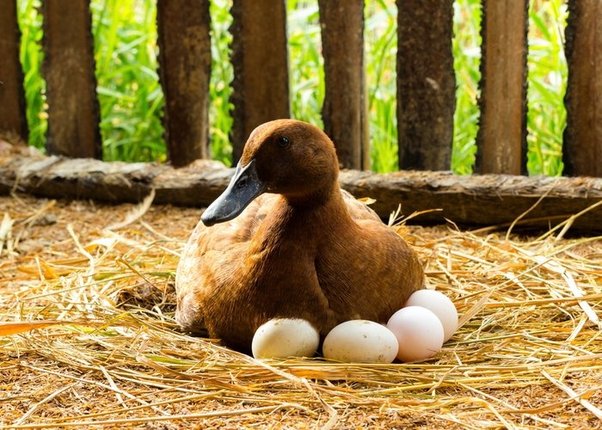- Home
- How Long after Mating are Duck Eggs Fertile?
How Long after Mating are Duck Eggs Fertile?
Ducks, geese, and swans are all members of the Anatidae family, composed of waterfowl. Ducks are generally birds that inhabit watery environments. They are often much smaller in size than geese and swans. Ducks may be found in both saltwater and freshwater most of the time.
A duck is a common name for a female duck, a drake is a common name for a male duck, and a duckling is a common name for a young duck. Eggs are the means through which ducks reproduce. These eggs may be deposited with or without the participation of a drake, depending on the situation.
On the other hand, eggs that the duck produced without her needing to mate with the drake are sterile and are often used for human consumption. Those eggs that resulted from a successful mating with a drake have, through the process of fertilization and, as a consequence, developed the capability to produce fertile offspring.
How Long after Mating are Duck Eggs Fertile?
As was said before, it is optional for a female duck to mate with a male duck for her to be able to produce eggs. About 4 to 7 months after they are born, ducks reach sexual maturity and can begin mating and laying eggs. This is only a rough estimate, and the actual time it takes ducks of different species to reach maturity varies greatly. This indicates that you should start to see the first batch of eggs produced by your duck between the ages of four and seven months.
|
Time it takes for duck eggs to be fertile |
Almost 10-14 days |
|
Laying period for ducks |
Approximately 2 weeks |
|
Incubation period for duck eggs |
About 1 month |
For instance, several varieties of chickens, such as Runners and Bantams, start producing eggs at the age of four months. Because Muscovies and Pekins are bigger than other breeds of chicken, they begin making eggs at around six months of age rather than the usual five months. Additionally, breeds like Khaki Campbells start producing eggs at about the four-month mark.
here have been reports of farmed ducks, such as Mallards, beginning to lay eggs in the springtime, even though these ducks are not of the age at which they are expected to do so.
After mating, the created eggs become viable for 10 to 14 days. When a duck is laying its eggs, it may take up to two weeks to finish laying all of them, beginning with the very first egg in that specific batch and ending with the very last egg in that batch. During this time, the duck will typically only lay one egg each day, adding up to a total of roughly 12 eggs by the season's conclusion.
After she has finished laying all the eggs, the duck will next sit on them to quickly and securely start the hatching process. This is done to ensure the safety and well-being of her young. The warmth produced by the mother duck is essential to this process because it envelops the eggs, allowing them to develop properly and getting them ready for hatching.
Although the length of time an egg is incubated varies from species to species of ducks, the rule of thumb is that it takes around one month. After the duck eggs are incubated, the shells of the eggs begin to crack and hatch, enabling the ducklings to appear first.
Why Do Duck Eggs Take That Long To Become Fertile After Mating?
In contrast to 97% of the other species of birds worldwide, male ducks, often known as drakes, are equipped with a phallus. Additionally, female ducks are born with a vaginal canal specifically designed to make room for the phallus of the male duck. If a female duck and a male duck decide to mate, this process leads to fertilization. Ducks now have a second means of breeding and depositing eggs because of the availability of this extra choice.
The male duck's phallus is responsible for delivering sperm to the female duck's vaginal canal so that she may get pregnant. This makes it possible for the sperm of the male duck to join with the eggs of the female duck, which ultimately results in the creation of a fertilized egg.
In the wild, it is common for female ducks to choose a certain male duck as their spouse for the duration of the mating season. This process may take place at any time. When the mating season is through, both the female duck and the drake will seek out new mates to increase the number of eggs they deposit that can develop into viable ducklings.
After mating, the sperm may be stored in the female duck's body for at least two weeks in the female duck's ovaries. At this period, the eggs that the female duck carries are effectively fertilized—because of this, turning an egg into a viable egg might take anywhere from 10 to 14 days. Due to the duck's capacity to retain sperm, it can fertilize many eggs within a single mating season. Most of the time, ducks reproduce in bodies of water rather than on land.
This is because they consider it a more natural mating setting, which is why they do so. On the other hand, this does not imply that ducks never reproduce on land since they often do so if the female duck chooses.
Frequently Asked Questions
- How soon can a fertilized duck egg be identified?
The intense light often stimulates the embryo. By Day 22, the origin fills so much of the egg that there is usually not much visible outside the air sac. If you light a candle on Day 26 or 27, you will often see the duck's beak moving within its air sac.
- How long after mating is a female duck fertile?
The hen retains sperm inside her body and produces viable eggs for up to two weeks.
- How does one determine if a duck egg is viable using a flashlight?
The bright illumination should encourage movement in the embryo. Eliminate any completely white eggs and lack veins or activity. If the egg lacks visible veins and appears white under bright light, it is most certainly dead.
- How can I tell if my ducks have mated?
You will tell when ducks have successfully copulated because they make a lot of noise. Males are much louder than females, who often emit a more subdued "urh-urh-urh" sound. Males will often make loud whistles and grunts during and after mating.



.png)

What other's say about : How ThePhone thriller..